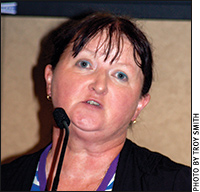ISBCW 2016:
Investigating New Weaning Strategies
To improve postweaning calf health and welfare, researchers evaluate weaning strategies.
by Troy Smith, field editor
MANHATTAN, Kan. (June 9, 2016) — In Ireland, grass-based cow-calf production systems often involve a period during which beef cattle are removed from pasture and housed. It’s a practice driven mostly by climate, but it’s not because the animals need shelter from the elements. According to animal scientist Bernadette Earley, housing cattle during Ireland’s typically wet winters prevents pasture “pugging” — the damage to plants and soil resulting from excessive hoof action on soaked sod.

Results suggest that reducing the cumulative effects of multiple stressors, by deferring housing for a 35-day postweaning period and offering concentrates preweaning, will lower the stress response,” said Bernadette Earley of Ireland’s Teagasc Animal and Grassland Research and Innovation Centre.
Weaning of spring-born calves often coincides with the time herds are moved indoors, explained Earley in a presentation delivered to the International Symposium on Beef Cattle Welfare hosted June 8-10 in Manhattan, Kan. A researcher with Ireland’s Teagasc Animal and Grassland Research and Innovation Centre, Earley talked about research related to the physical, psychological and nutritional stress calves experience as a result of movement into confinement, change of diet, transportation and commingling of calf groups.
More specifically, Earley explained studies related to stress-influenced alterations of immune function in weaned calves, and increased susceptibility to disease, especially to bovine respiratory disease (BRD).
“It is important to study weaning as a stressor in order to determine its effects and the mechanisms through which it exerts these effects. The knowledge gained may identify effective weaning strategies to prevent or treat disease. With the ultimate aim of improving the health and welfare of beef calves around the time of weaning, our overall aim was to gain a better understanding of the effects of weaning stress in beef calves,” stated Earley.
To determine how producers might improve postweaning calf health and welfare through a different weaning strategy, research studies compared stress responses of calves that were abruptly weaned, housed in slatted-floor sheds and fed a diet of silage plus concentrates, with the responses of calves that were returned to familiar pasture immediately after weaning.
According to Earley, findings suggest that the abruptly weaned and housed calves did experience higher stress response, as indicated by levels of neutrophils and lymphocytes — white blood cells involved in immune function. A subsequent study showed that calves offered preweaning concentrate supplementation showed a reduced stress response, compared to calves that were not supplemented prior to weaning.
“Results suggest that reducing the cumulative effects of multiple stressors, by deferring housing for a 35-day postweaning period and offering concentrates preweaning, will lower the stress response,” said Earley.
But what about the cow? How much stress does a beef cow experience due to the abrupt weaning of her calf? Does separation from her calf cause changes to physiological and immunological processes similar to those experienced by the calf?
Earley said observation of behavior suggests that it is so, and blood analysis indicates that cows do experience weaning stress similar to that exhibited by calves. In terms of its magnitude and duration; however, weaning-stress response in cows typically is less than it is for calves.
According to Earley, Teagasc researchers are hopeful that their studies will help identify potential biomarkers of stress-susceptible animals likely to succumb to postweaning disease infection.
Watch for additional coverage of the 2016 ISBCW on www.angus.media and in the Angus Journal and Angus Beef Bulletin. Comprehensive meeting coverage will be archived at www.api-virtuallibrary.com/meetings_other_news.html.
Editor’s Note: The articles used within this site represent a mixture of copyrights. If you would like to reprint or repost an article, you must first request permission of Angus Media by contacting the editor at 816-383-5200; 3201 Frederick Ave., Saint Joseph, MO 64506. Angus Media claims copyright to this we site as presented. We welcome educational venues and cattlemen to link to this site as a service to their audience.
